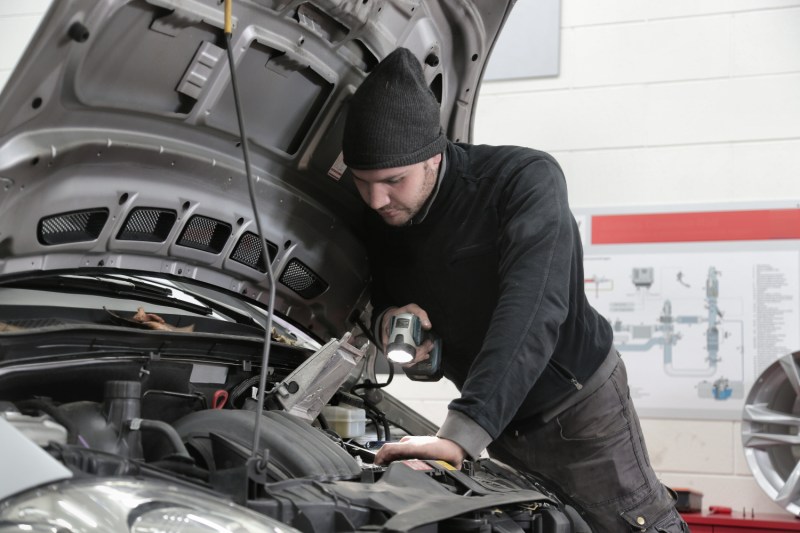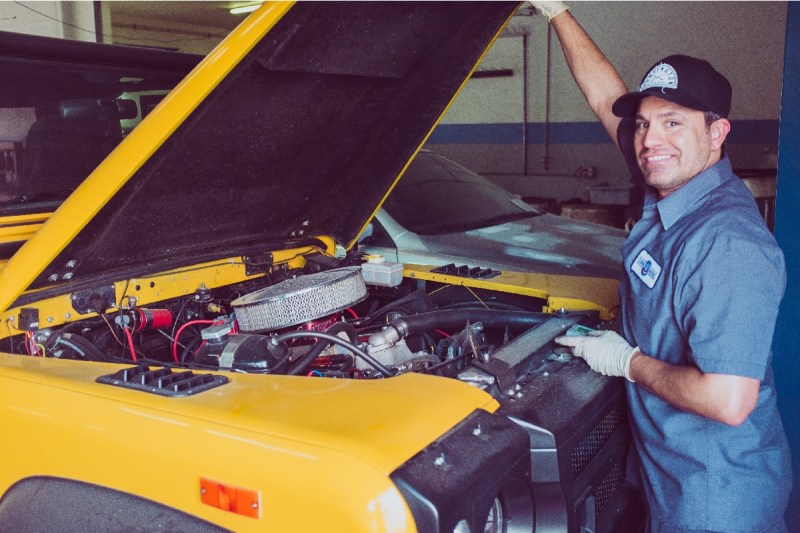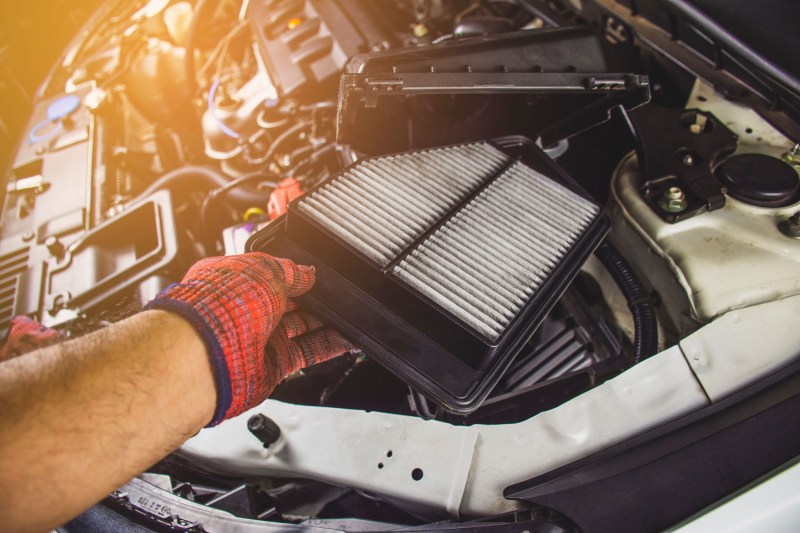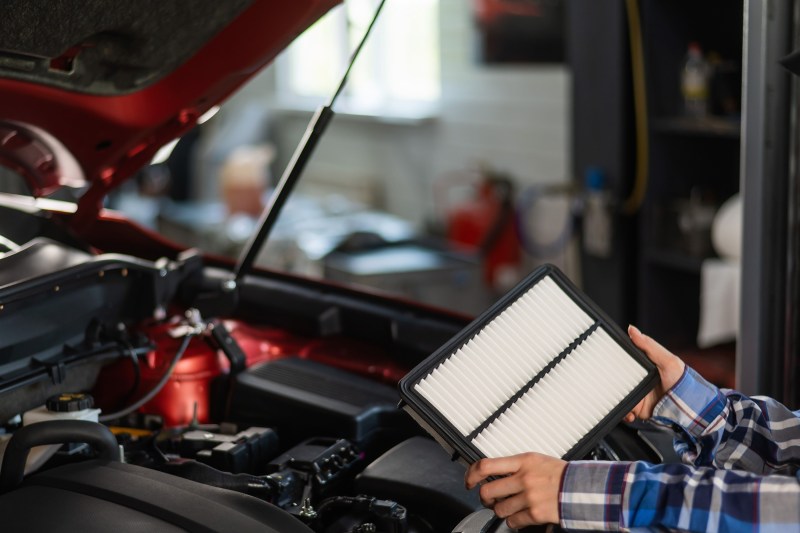Changing the oil, washing your car, and making sure your tires are in good working order are all part of routine maintenance when you own a vehicle. Changing your car's engine air filter is critical, too. But before you start poking at things under the hood, it's important to understand that your car actually has two air filters: A cabin air filter and an engine air filter (a.k.a. “vehicle air filter”).
The cabin air filter ensures that passengers inside your car have clean air to breathe. This is an especially important component for city dwellers or anyone who lives in an area with poor air quality. The engine air filter, on the other hand, keeps the air your engine “breathes” clean and free of dirt, dust, and other particles — all of which can affect how efficiently your car runs. A dirty air filter can result in ignition problems, lower gas mileage, and, if neglected over the long-term, shortened engine life.
Every modern vehicle engine is a little different, but all require a steady mix of fuel and oxygen to run properly. Imagine trying to breathe through a face mask caked in dirt, dust, and other environmental contaminants. That’s what it’s like for your engine to run with a dirty engine air filter. Thankfully, changing the filter is one of the simplest and cheapest routine maintenance items to tackle. (Even easier than changing your oil!) Modern engine air filters are easy to access and typically require few or no household or garage tools to replace. Here’s the lowdown on how often do you change the engine air filter in your vehicle and how you can do it yourself in less than five minutes.

How to replace the engine air filter in your car in just 5 minutes
Step 1: Open your vehicle’s hood. To locate the engine air filter housing, look for a large, usually black, plastic box sitting atop or to the side of the engine. There should be a large hose coming out of one side.
Step 2: Note how the filter housing is secured. In most cases, two hands and some elbow grease are all that’s required to open it. Some manufacturers, however, use clamps, clips, screws, wing nuts, or a combination of these, in which case you’ll need an appropriate tool.
Step 3: Open the top of the housing. Remove and discard the old air filter. Wipe any remaining debris from inside the housing with a clean shop rag.
Step 4: Note how the existing air filter is installed. Install the new engine air filter by placing it inside the housing with the rubber rim facing up. Ensure it’s seated properly and snugly inside the housing.
Step 5: Close the filter housing and replace any fasteners (screws, clips, etc.) removed in Step Two. Close the hood, and pat yourself on the back for a job well done (and a bit of beer money saved too). That’s it!

How often do you change the engine air filter in your car?
All air filters, including engine air filters, should be replaced regularly. The short answer for exactly when to replace yours is: It depends. Your vehicle’s year, make, and model, how you drive, and even where you drive — if it happens to be in an area that’s hotter or more polluted than normal — can all affect the filter-changing schedule. The easiest way to know for sure how often to change the engine air filter is to check the maintenance section of your owner’s manual or simply Google to find the manufacturer’s recommended service interval. This can vary widely from 15,000 miles in severe driving conditions to as much as 45,000 miles.
A visual inspection is usually enough to provide a “status check.” New filters are stark white or off-white. A dirty engine air filter will usually look dirty with visible dirt, dust, or stains inside the pleats. If in doubt, any reputable car mechanic in your area will be able to tell you for sure. As a rule of thumb, most average drivers should be able to go one to two years before needing a new air filter. A word of warning: Any mechanic who recommends a new engine air filter every time you bring your vehicle in for an oil change (i.e., every 3,000-5,000 miles) is a red flag.

How often to replace the cabin air filter in your car
Like vehicle air filters, cabin air filters should also be changed regularly as part of your vehicle’s routine maintenance. Most manufacturers recommend scheduled intervals between 15,000 to as high as 45,000 miles. To simplify things, consider changing both of your car’s filters at the same time. The good news is that replacing the cabin air filter in your car is even easier and cheaper than changing the engine air filter. It’s something anyone can do in less than five minutes with few or no tools required. New cabin air filters are readily available on Amazon and at most typical automotive retailers, typically for less than $20.

Why is changing an engine air filter important?
While changing the engine air filter is one of the easier pieces of maintenance a car owner can do, an air filter is an important part of your car's engine. It keeps contaminants, big and small, out of the engine to ensure it has clean air to keep it running. There's a small chance that a dirty air filter will allow dirt and small pieces of debris to get into your engine. A dirty air filter will also sap performance and reduce fuel economy.
Regularly changing your car's air filter will prolong the life of the engine, reduce emissions, improve fuel economy, and, depending on what kind of filter you use, could even bring some extra performance. The benefits far outweigh the small amount of time and effort it takes to complete the job.

What are the symptoms of a bad engine air filter?
There are a number of warning signs that your engine's air filter needs to be replaced. All are fairly obvious, and if you notice your vehicle exhibiting one or more of these, it's a good idea to check the filter before calling a mechanic:
- Poor engine performance or acceleration: This could be due to a wide number of issues with your vehicle. But a dirty engine filter not providing enough clean air to your vehicle's motor can definitely be one of them.
- Check engine light: There's a long list of symptoms that can throw your check engine light. But checking your car's engine filter is a good place to start your diagnosis.
- Tailpipe smoke: A dirty engine air filter can cause your car's fuel to combust inefficiently. The unburnt fuel can leave your car's tailpipe as a black, sooty smoke.
- Decreased gas mileage: If you notice a sudden drop in your car's fuel efficiency, check the engine air filter. Here again, it could be the culprit.
Modern vehicles are far more complex than their predecessors. That means most maintenance tasks require a professional — a mechanic with proper training, tools, and specialized hardware — to tackle. Thankfully, changing your car's air filters isn't one of those tasks. Armed with the easy-to-follow directions above, a little determination, and a new air filter, you can easily swap out your vehicle's air filters on your own with little to no tools necessary.




